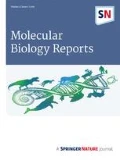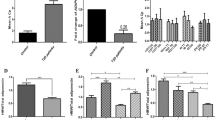Abstract
Studies have shown that single-nucleotide polymorphisms (SNPs) on the ADIPOQ gene have been linked with obesity and with adiponectin levels in various populations. Here, we aimed to investigate the association of ADIPOQ rs17366568 and rs3774261 SNPs with obesity and with adiponectin levels in Malaysian Malays. Obesity parameters and adiponectin levels were measured in 574 subjects. Genotyping was performed using real-time polymerase chain reaction and Sequenom MassARRAY. A significant genotypic association was observed between ADIPOQ rs17366568 and obesity. The frequencies of AG and AA genotypes were significantly higher in the obese group (11 %) than in the non-obese group (5 %) (P = 0.024). The odds of A alleles occurring among the obese group were twice those among the non-obese group (odds ratio 2.15; 95 % confidence interval 1.13–4.09). However, no significant association was found between allelic frequencies of ADIPOQ rs17366568 and obesity after Bonferroni correction (P > 0.025) or between ADIPOQ rs3774261 and obesity both at allelic and genotypic levels. ADIPOQ SNPs were not significantly associated with log-adiponectin levels. GA, GG, and AG haplotypes of the ADIPOQ gene were not associated with obesity. We confirmed the previously reported association of ADIPOQ rs17366568 with the risk of obesity. ADIPOQ SNPs are not important modulators of adiponectin levels in this population.
Similar content being viewed by others
References
Weyer C, Funahashi T, Tanaka S, Hotta K, Matsuzawa Y, Pratley RE, Tataranni PA (2001) Hypoadiponectinemia in obesity and type 2 diabetes: close association with insulin resistance and hyperinsulinemia. J Clin Endocrinol Metab 86(5):1930–1935
Arita Y, Kihara S, Ouchi N, Takahashi M, Maeda K, Miyagawa J, Hotta K, Shimomura I, Nakamura T, Miyaoka K, Kuriyama H, Nishida M, Yamashita S, Okubo K, Matsubara K, Muraguchi M, Ohmoto Y, Funahashi T, Matsuzawa Y (1999) Paradoxical decrease of an adipose-specific protein, adiponectin, in obesity. Biochem Biophys Res Commun 257(1):79–83
Ouchi N, Kihara S, Arita Y, Maeda K, Kuriyama H, Okamoto Y, Hotta K, Nishida M, Takahashi M, Nakamura T, Yamashita S, Funahashi T, Matsuzawa Y (1999) Novel modulator for endothelial adhesion molecules: adipocyte-derived plasma protein adiponectin. Circulation 100(25):2473–2476
Hardie DG (2003) Minireview: the AMP-activated protein kinase cascade: the key sensor of cellular energy status. Endocrinology 144(12):5179–5183
Yamamoto Y, Hirose H, Saito I, Nishikai K, Saruta T (2004) Adiponectin, an adipocyte-derived protein, predicts future insulin resistance: two-year follow-up study in Japanese population. J Clin Endocrinol Metab 89(1):87–90
Berg AH, Scherer PE (2005) Adipose tissue, inflammation, and cardiovascular disease. Circ Res 96(9):939–949
Jee SH, Sull JW, Lee JE, Shin C, Park J, Kimm H, Cho EY, Shin ES, Yun JE, Park JW, Kim SY, Lee SJ, Jee EJ, Baik I, Kao L, Yoon SK, Jang Y, Beaty TH (2010) Adiponectin concentrations: a genome-wide association study. Am J Hum Genet 87(4):545–552
Heid IM, Wagner SA, Gohlke H, Iglseder B, Mueller JC, Cip P, Ladurner G, Reiter R, Stadlmayr A, Mackevics V, Illig T, Kronenberg F, Paulweber B (2006) Genetic architecture of the APM1 gene and its influence on adiponectin plasma levels and parameters of the metabolic syndrome in 1,727 healthy Caucasians. Diabetes 55(2):375–384
Stumvoll M, Tschritter O, Fritsche A, Staiger H, Renn W, Weisser M, Machicao F, Haring H (2002) Association of the T-G polymorphism in adiponectin (exon 2) with obesity and insulin sensitivity: interaction with family history of type 2 diabetes. Diabetes 51(1):37–41
Vasseur F, Meyre D, Froguel P (2006) Adiponectin, type 2 diabetes and the metabolic syndrome: lessons from human genetic studies. Expert Rev Mol Med 8(27):1–12
Yang WS, Chuang LM (2006) Human genetics of adiponectin in the metabolic syndrome. J Mol Med (Berl) 84(2):112–121
Du J, Ye X, Li Q, Yu X, Cheng J, Ma J, Gao Y, Lu Y, Du W, Shi H, Zhao X, Ye Q, Zhou L (2012) Genetic variants in the ADIPOQ gene and the risk of metabolic syndrome: a case-control study of a Chinese Han population. Ann Hum Genet 76(2):101–109
Matsubara M, Maruoka S, Katayose S (2002) Inverse relationship between plasma adiponectin and leptin concentrations in normal-weight and obese women. Eur J Endocrinol 147(2):173–180
Gable DR, Hurel SJ, Humphries SE (2006) Adiponectin and its gene variants as risk factors for insulin resistance, the metabolic syndrome and cardiovascular disease. Atherosclerosis 188(2):231–244
Warodomwichit D, Shen J, Arnett DK, Tsai MY, Kabagambe EK, Peacock JM, Hixson JE, Straka RJ, Province MA, An P, Lai CQ, Parnell LD, Borecki IB, Ordovas JM (2009) ADIPOQ polymorphisms, monounsaturated fatty acids, and obesity risk: the GOLDN study. Obesity 17(3):510–517
Heid IM, Henneman P, Hicks A, Coassin S, Winkler T, Aulchenko YS, Fuchsberger C, Song K, Hivert MF, Waterworth DM, Timpson NJ, Richards JB, Perry JR, Tanaka T, Amin N, Kollerits B, Pichler I, Oostra BA, Thorand B, Frants RR, Illig T, Dupuis J, Glaser B, Spector T, Guralnik J, Egan JM, Florez JC, Evans DM, Soranzo N, Bandinelli S, Carlson OD, Frayling TM, Burling K, Smith GD, Mooser V, Ferrucci L, Meigs JB, Vollenweider P, Dijk KW, Pramstaller P, Kronenberg F, van Duijn CM (2010) Clear detection of ADIPOQ locus as the major gene for plasma adiponectin: results of genome-wide association analyses including 4659 European individuals. Atherosclerosis 208(2):412–420
Ling H, Waterworth DM, Stirnadel HA, Pollin TI, Barter PJ, Kesaniemi YA, Mahley RW, McPherson R, Waeber G, Bersot TP, Cohen JC, Grundy SM, Mooser VE, Mitchell BD (2009) Genome-wide linkage and association analyses to identify genes influencing adiponectin levels: the GEMS Study. Obesity 17(4):737–744
Cohen SS, Gammon MD, North KE, Millikan RC, Lange EM, Williams SM, Zheng W, Cai Q, Long J, Smith JR, Signorello LB, Blot WJ, Matthews CE (2011) ADIPOQ, ADIPOR1, and ADIPOR2 polymorphisms in relation to serum adiponectin levels and BMI in black and white women. Obesity 19(10):2053–2062
Bowden DW, An SS, Palmer ND, Brown WM, Norris JM, Haffner SM, Hawkins GA, Guo X, Rotter JI, Chen YD, Wagenknecht LE, Langefeld CD (2010) Molecular basis of a linkage peak: exome sequencing and family-based analysis identify a rare genetic variant in the ADIPOQ gene in the IRAS Family Study. Hum Mol Genet 19(20):4112–4120
Teo YY, Sim X, Ong RT, Tan AK, Chen J, Tantoso E, Small KS, Ku CS, Lee EJ, Seielstad M, Chia KS (2009) Singapore Genome Variation Project: a haplotype map of three Southeast Asian populations. Genome Res 19(11):2154–2162
Gibson F, Froguel P (2004) Genetics of the APM1 locus and its contribution to type 2 diabetes susceptibility in French Caucasians. Diabetes 53(11):2977–2983
Acknowledgments
This study was supported by research grants RG075-09HTM from the University of Malaya and HIR-MOHE E000049-20001. We would like to acknowledge the assistance of Ms. Devi Peramalah, the Wellness Program team, Narong Jaturas, Thanet Sornda, the medical students who assisted in data collection, and all of the participants in this research. We would also like to acknowledge Barbara Every, a board-certified Editor in the Life Sciences (ELS) for editing the manuscript.
Conflict of interest
The authors declare no conflict of interest.
Author information
Authors and Affiliations
Corresponding author
Rights and permissions
About this article
Cite this article
Apalasamy, Y.D., Rampal, S., Salim, A. et al. Association of ADIPOQ gene with obesity and adiponectin levels in Malaysian Malays. Mol Biol Rep 41, 2917–2921 (2014). https://doi.org/10.1007/s11033-014-3147-0
Received:
Accepted:
Published:
Issue Date:
DOI: https://doi.org/10.1007/s11033-014-3147-0




